Hospice pupils 'want to live life to the full'
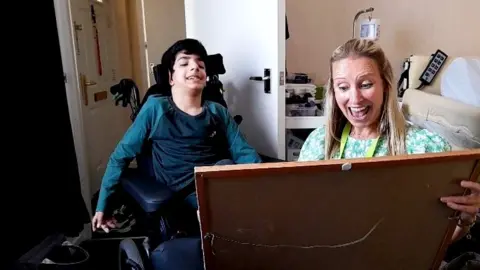 Katie Simmons
Katie Simmons"Death and dying is really difficult for a lot of people to talk about, but it is something we talk about honestly."
Katie Simmons is a former primary school teacher turned children's rights and education practitioner who spends her working days with children who are unlikely to live much longer.
She performs what is believed to be a unique role in a UK hospice - when terminally ill children can no longer go to school, she brings school to them to make sure they are not missing out on the education and stimulus that is central to their wellbeing.
Katie's role at Ty Hafan children's hospice in Sully, Vale of Glamorgan, was created for her after she initially joined to set up a youth board and develop children's rights.
While other hospices might have an NHS teacher visit to help residents or siblings with homework, Katie's dedicated role means she can deliver a programme to a child in their home or sometimes in school if they are struggling and need extra support.
Her pupils' ages range from three years old to 18 and while she has yet to support an A-level student, she has a GCSE pupil on her books.
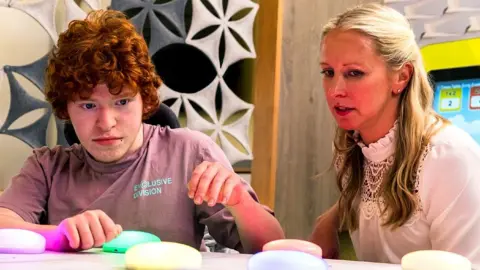 Katie Simmons
Katie Simmons"Children are living longer because medicine has moved on so much," said Katie.
"So if children are living longer then they should be getting their education – it's even more important that they get their education and some qualifications so that they feel able to carry on with their life and have a purpose."
She said bed-bound children could end up just gaming a lot of the time "and you know it's not good for us".
'They don't consider their lives to be sad'
Katie said she has rarely found an attitude of "what's the point in learning" in the young people she supports.
"For all of the children I work with, they don't see their conditions as 'I'm going to die soon'. They just want to live their life to the full.
"You know, they're still children. They still want to communicate. They still want friends.
"I've got a 17-year-old who's desperate for a girlfriend, you know, they still want all these experiences. They don't consider their life to be sad."
While some children attend mainstream school, others with more complex conditions have different educational needs.
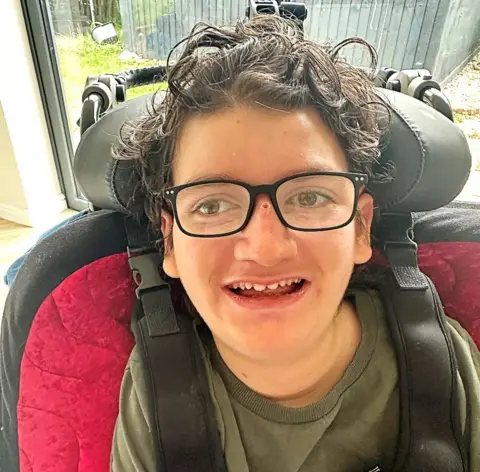 Alex Forbes
Alex ForbesOne of these is 12-year-old Felix Forbes from Llantwit Major, Vale of Glamorgan, a pupil at Ysgol-y-Deri special school in Penarth.
He was born with Miller-Dieker syndrome, which causes abnormal brain development. His mother Alex said this means he cannot walk or talk, is fed through a tube and has daily seizures.
Felix was first referred to Ty Hafan at four months old and his family has been supported ever since with counselling, respite care and a sibling club for his younger sisters Lottie and Maggie.
"Round about October, Felix fell really, really poorly and it was actually end of life. So we were in hospital, they said there was nothing more they could do for him so we were transferred to Ty Hafan," Alex said.
"He miraculously turned it around and it was a slow process getting back to normal but he wasn't able to go back to school because care plans had to be changed."
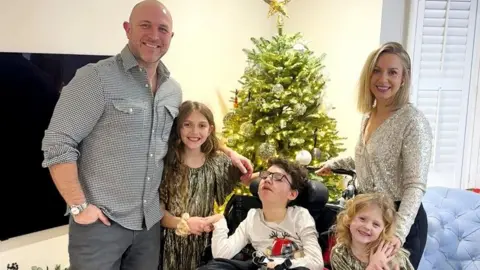 Katie Simmons
Katie SimmonsAfter leaving hospital, Ty Hafan told Alex about the possibility of Katie working with Felix, to which she replied: "Oh my god, please."
She said Felix thrived in school, adding: "He needs to have the stimulation, the specialist equipment, all the teachers who know how to push him and when he doesn't have anything like that I really notice a change in him."
Felix's educational sessions involve "using different equipment, interactive pieces where he can follow lights and listen to the sound," she added.
Alex said Katie "bought her goody bag and it was just amazing".
"It's very emotional what we experience with Fee anyway, but her coming into the house and seeing the progress he was making after he'd been so unwell, see him more than thriving, it makes us feel like we're being supported as well."
Susan Southard, a full-time carer to her 15-year-old granddaughter Keira, has also felt the impact of Katie's presence.
Keira, who lives with her grandparents in Carmarthenshire, has multiple conditions and is blind, non-verbal and a wheelchair user.
Like Felix, she became seriously ill last year and was in hospital for six months after having two operations and spending time in intensive care.
She was discharged on palliative care, unable to return to her class at Ysgol Crug Glas special school in Swansea, and referred to Ty Hafan.
Susan said Keira had had "quite a fulfilling life until she became ill", adding: "She was in school five days a week. She did everything that the other children would be doing."
Katie would come and do things like light button play with Keira, helping her press a pattern of lights to respond to a musical pattern, or bubble play, tell stories and music therapy.
"Keira loves interaction, and anything that's tactile or music based is very good for her," said Susan.
Keira can take a long time to build trust with people but she and Katie "just had this rapport, and she knew she was safe with Katie. She'd know Katie as soon as she came," Susan added.
She said having someone like Katie "gives you a break because it's somebody who knows Keira, who can interact with her, rather than you being the 24/7 giver all the time".
Keira improved enough to return to school, but Katie has stayed involved, helping advise on new care plans and still calls in to see her.
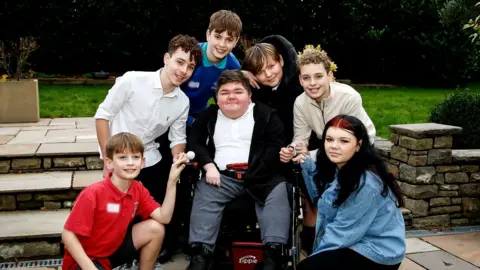 Ty Hafan children's hospice
Ty Hafan children's hospiceBut does it get overwhelming for Katie, dealing with children whose lives are cut so short?
While she acknowledges the stresses of the job, she and other staff get support and counselling from Ty Hafan and the reward she feels working with the children outweighs everything.
"Every time I come away from a visit my heart smiles because they get so much out of it.
"Creating that close bond and then losing them, I think I just feel blessed that I got the opportunity to work with them and get to know them."
